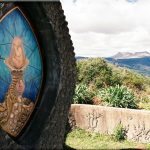
Darkness Before Dawn (Part 3) – A Heart Monitor (UPDATED)
In this 6-part series, we are exploring the purpose of polarity and the nature of truth. Please see index at the bottom of the page for chapter selection.
A Heart Monitor
“The test of any Soul’s maturity will be reflected by the choices it makes while experiencing life’s challenges, sometimes in severe blindness when all of one’s reality opposes one’s nature. Its successes will be determined simply by its capacity to align itself to the purity and natural instinct of its heart.” (“Our Rebirth as the Morning and Evening Star”) [1]
All indications are that humans are going through an extensive testing period. We have heightened polarity (extreme polarity some may say) and a concentration of darkness (some may say extreme darkness) at the same time (See: Part 1: “Why is the polarisation so extreme?”).
If the universe wanted to gauge people’s hearts and souls, how might it do it? The reader might have noticed that this question has just been framed in a way that personalises the universe, which is exactly what many religions do and what some ancient cultures – like the Maya – did when they assigned archetypes and symbols to the metaphysical energies that they identified. Through this method, the purpose of metaphysical processes in the universe can be depicted, symbolised and described, and the role of the universe itself as an intelligent creative force – through intelligent design – can be illustrated.
If the earth is a learning ground and a training platform for human souls – a belief held by Mayans and some schools of Hinduism among others – then, surely, periodic testing to evaluate soul development would be in order.
Perhaps, the universe would let humanity pass through a heightened level of polarity for soul testing. If the capacity for compassion lies at the centre of each soul’s sentience, then – surely – it is plausible that one way to gauge soul development would be through heart-monitoring. In turbulent times, the capacity for discernment between matters of dark and light, wrong and right, ethical and non-ethical, love and hate and so on should certainly be found at the heart of each soul.
By shaking things up, by shifting the energy and, therefore, the circumstances, a person’s inner integrity could be evaluated. When this happens, some people may unexpectedly – or, perhaps “inexplicably” – find themselves on the wrong side of important moral or social issues, but that should only happen if a person holds double standards (This will be discussed further in Part 6.)
Moral Development
If only it were all so simple! If only there were evil people somewhere insidiously committing evil deeds, and it were necessary only to separate them from the rest of us and destroy them. But the line dividing good and evil cuts through the heart of every human being. And who is willing to destroy a piece of his own heart? During the life of any heart this line keeps changing place; sometimes it is squeezed one way by exuberant evil and sometimes it shifts to allow enough space for good to flourish. One and the same human being is, at various ages, under various circumstances, a totally different human being. At times he is close to being a devil, at times to sainthood. But his name doesn’t change, and to that name we ascribe the whole lot, good and evil. Socrates taught us: Know thyself! – Aleksandr Solzhenitsyn, The Gulag Archipelago [2]
Due to the nature of duality, we subjectively tend to perceive things as right or wrong – to varying degrees – and this happens for a reason. Without applying judgement through discernment, moral development would not take place. If everything is perceived as relative, the necessary differentiation that would lead to moral autonomy cannot occur.
That said, if most people took a highly subjective and puritanical view on right and wrong – which increasingly seems to be the case [3] – extreme polarisation would be the result. Taking all viewpoints into consideration for balance would, therefore, always be the wisest approach.
Nothing is ever purely black or white, but people frequently support popular causes stridently because they take their lead from their group or from society at large. The true or deeper merits of issues are rarely evaluated anymore since “moral correctness” is nowadays often practised in the same way as political correctness – people believe and say what their groups believe and say [3].
Being uninformed on real issues can inadvertently – perhaps, somewhat innocently in some cases – lead to supporting evil in the name of good. However, the question that presents itself here is whether the support of evil could ever be good, especially when there is wilful ignorance involved, which is often the case with ideology.
Reality Can Shift
Sometimes, yesterday’s victims can become today’s oppressors (and vice versa …) and, in such a scenario, the test would be whether such a reorientation would be recognised and would be campaigned against as strongly or vigorously as when it used to be the other way around.
Whether people are able to shift their attention and their perception would be evaluated because, in such a context, the altered circumstances would bring about a new truth. Only persons with a well-formed ethical and moral core would be autonomous enough to be consistent in how their moral values are applied.
A universal principle such as human rights, for example, would only be consistently upheld by people who truly believe in the actual concept. Those who support human rights, but only for themselves and their groups along with their allies, could end up exposing their inconsistencies through their obvious double standards.
Context can shift, especially when both sides of an issue come to light. This could happen in cases where only one side of a truth had been presented all along, which had given the impression that the moral high ground was predominantly only on one side.
A person with high moral integrity would adjust their position to factor in new information when it becomes available. Moreover, a truth-lover would eagerly seek out and integrate new (or missing) information pertaining to the causes they support, in order to have a balanced view and to remain as close as possible to the truth.
If, for example, we have come to believe that everything is relative – as would apparently be the case in a hypothetical ‘post-truth’ world – we may end up finding ourselves naked just like the proverbial emperor with no clothes when shifting circumstances cause context to shift into a new light of truth. (This will be discussed further in Part 6.)
A Truth Distillery
The oscillation of polarity has the function of distilling a person’s personal truth out of the person – through circumstantial shifts caused by energy shifts – which leads to the development and strengthening of various inner components related to the discernment of truth. During all this oscillation, a person’s beliefs, morals and ethics are defined, tested, redefined and refined through many readjustments – and conscience is strengthened in the process.
By. J.J. Montagnier
(Published on July 25, 2019. Updated on April 17, 2020)
In the next chapters, we will continue to take a deep dive into how polarity facilitates human development and growth; we will consider how we as individuals can find our purpose and maintain balance within our polarised times; we will contemplate the nature of truth in a ‘post-truth’ world and we will consider how we can get ready for the incoming light of truth. Please subscribe to receive alerts for updates.
[Please note that this series is a work in progress. Some edits may occur after publication. Sometimes, content earmarked for follow-up chapters only makes it into later chapters.]
J.J. Montagnier is a futurologist and travelosopher. His writings are inspired and influenced by his world travels, personal and social observations, intuitive insights and the deep study of relevant and related subject matter.
INDEX
Part 1-A
Part 1-B
Part 1-C
Part 1-D
Part 1-E
Part 2
Part 3 <<
Part 4
Part 5
Bibliography:
[1] “Venus, Our Rebirth as the Morning and Evening Star” The Sacred Tree, The Daiva Yugas and The World Cycles of Human Evolution. Author anonymous / Date unknown Book, Pdf. Web. 10 March, 2020. Page 78. <https://gypsycafe.org/wp-content/plugins/download-attachments/includes/download.php?id=5283>
[2] Solzhenitsyn, Aleksandr (author) and Whitney, Thomas P. (translator), The Gulag Archipelago, 1918 – 1956 Vol. 1. Chapter 4, Page 168. Harper & Row, 1974
[3] “The totalitarian doctrine of social justice warriors.” Observer.com. Web. 10 March, 2020 <https://observer.com/2016/02/the-totalitarian-doctrine-of-social-justice-warriors>
Copyright © 2019 · All Rights Reserved · Gypsy Café


5 Comments
Dear Readers,
Thank you for reading.
NEWS UPDATE:
Part 3 will be published by or before the end of 2019.
Thank you for your patience.
Best wishes,
J.J. Montagnier
Extreme polarization and pressure as urgency – and tearing myself away. That defines very well my worldly experience. I always want to be facing light. I’ve had enough unconsciousness from the world. We are free to follow happiness – we don’t have to keep feeding love to darkness to make it end.
Mercury goes direct 7/31, though someone mentioned we’ll start out covering the same ground. Maybe we navigate it differently the second time.
Thanks for the enlightening article The mural was sad, but real.
in lak’ech, Debra
Hi Debra – I fully agree – we are indeed free to follow happiness and I believe that it is not found in giving love to darkness. Darkness (outside of us) is not converted through love – darkness has to confront itself – it can only enlighten itself from within.
That said, any darkness within ourselves – we all have a shadow side according to Carl Jung – is something we need to confront personally – we need to identify it and acknowledge that it is there – then we need to bring it fully into consciousness and question where it comes from – we need to analyse it to understand it better – and through that understanding we will be able to work out a way to resolve it internally – it needs to brought to the light from the depths where we choose not to look at it or consider it – although this does have to be done in a spirit of love too, not in a spirit of judgement.
As you said, we should start facing the incoming light and meet it halfway with love (like a welcoming party…) It just needs open hearts and souls to find a resting place in, after such a long journey through darkness.
This actually seems to be a very good time for continued deep inner work.
I appreciate your feedback, Debra. Glad it provided food for thought. Agreed on your comment about the mural.
Onwards and Upwards -> Towards the Light -> Always.
in lak’ech,
Jacques
Hi Jacques – Thanks for the perspective. I can add that piece to discernment – darkness needing to confront itself. It puts a point to a loose thought. We shine our light on things so WE can transform it to hold a divine place in OUR thoughts. The one who claims darkness still has to see it for themselves. All we CAN do is offer our thoughts of Light to the ONLY one who can direct thoughts. Seems like the best we can do is just shine on and hold our own happiness. Interesting that the black moons cycle as 29, 19, 33 in the count. Those are all sacred numbers of a Divine Signature. Also, hoping to change others, assumes whatever they are doing can’t lead to Divine – and ALL things can lead us there.
Thanks for food for thought, much love, in lak’ech, Debra
Hi Debra, yes exactly – although we are able to notice darkness in others we can only work on our own darkness. And they can only work on their own darkness. We all have to work on our own shadow.
One of the biggest problems in the world is that everyone can see the darkness in others, but not in themselves – and in these polarized times it has reached a crescendo.
A lot of the darkness that people imagine they see in others, is actually (also) within them. This is classically known as projection in psychology, which is why Jung hammered so much on inner-work: introspection is required to see one’s own shadow (first).
Most people actively avoid introspection by pointing out the darkness in everyone else. Of course, as with everything, discernment is required. Not everything is projection. The darkness we notice in others may very well be real, but we need to also check if we do not possess the very same darkness within ourselves.
I believe that it is important for people to keep each other on the right track by pointing out negative behaviour, but always with acknowledgement that they/we are equally capable of the same behaviour if we do not keep ourselves in check.
Everyone is on their own path in this life, but one thing everyone should be engaged in is enlightening themselves from within through introspection – no adult can honestly claim moral exemption from this universal responsibility towards society and humanity, although of course very many people do exactly that, which is due to an overall lack of maturity at the human developmental level (soul level) at this stage of the evolutionary cycle.
That’s not to say we all have to be angels (!), but we have a personal responsibility to remove our personal contributions of malice and malevolence from the world – as far as that is possible.
Thanks very much Debra for assisting in fleshing out this subject even more.
More to come in Part 3 [EDIT: publishing date moved back towards end of 2019]
in lak’ech,
Jacques